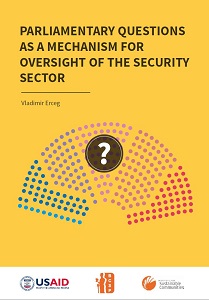Parliamentary Questions as a Mechanism for Oversight of the Security Sector
Parliamentary Questions as a Mechanism for Oversight of the Security Sector
Author(s): Vladimir Erceg
Subject(s): Politics / Political Sciences, Politics, Civil Society, Public Administration, Government/Political systems, Security and defense, EU-Approach / EU-Accession / EU-Development, Fiscal Politics / Budgeting, Corruption - Transparency - Anti-Corruption
Published by: BCBP Beogradski centar za bezbednosnu politiku
Keywords: Democracy; Parliament; National Assembly of Serbia; Constitution; Corruption; National budget; Parliamentary control
Summary/Abstract: This document highlights the importance of tracking political party pledges to ensure democracy remains functional and accountable. Without such tracking, democracy risks being reduced to mere voter approval during elections, allowing political elites to focus solely on re-election strategies rather than serving the public will. Over time, this undermines democratic values and erodes confidence in institutions. The National Assembly of Serbia, as defined by the Constitution, is the supreme legislative body responsible for ensuring democratic checks and balances. It holds powers to oversee, control, and, if necessary, terminate the mandates of the government and individual ministers. This oversight is particularly crucial in the security sector due to its potential for power concentration, significant budget allocation, and its role in safeguarding citizens' rights. Parliament also serves as a critical intermediary between the public and executive power structures. The National Assembly employs several mechanisms to exercise its oversight role, including parliamentary questions, reports on government functioning, and interpellation. Parliamentary questions are a significant tool for scrutinizing government activities, particularly in the fields of security, defence, and internal affairs. These questions can address corruption and the management of resources within the security sector. An analysis of the eighth and ninth parliamentary terms (2008–2012) of Serbia's National Assembly reveals both the application and limitations of parliamentary questions in overseeing the executive. While this mechanism is widely used, shortcomings in its application were identified, prompting recommendations for improvement. The article underscores the necessity of enhancing these oversight tools to strengthen parliamentary control, especially in addressing corruption and ensuring transparency in the security sector.
- Print-ISBN-13: 978-86-6237-093-8
- Page Count: 40
- Publication Year: 2014
- Language: English
- eBook-PDF
- Table of Content
- Introduction

